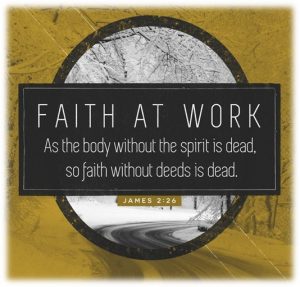JAMES 2: DEAD FAITH
 As I start the Christmas season with yet another year drawing to a close, I feel reminded again of the Creator God’s global story and just how brilliant is His “Handbook for Life”. If my life experience was within a global corporation, it’s as if the founder and CEO uses the Year-End to re-establish the “standard of care” that He requires – not just for His employees, but for His customers as well.
As I start the Christmas season with yet another year drawing to a close, I feel reminded again of the Creator God’s global story and just how brilliant is His “Handbook for Life”. If my life experience was within a global corporation, it’s as if the founder and CEO uses the Year-End to re-establish the “standard of care” that He requires – not just for His employees, but for His customers as well.
And so, today’s chapter is part of a 1st Century letter written by a Jewish Religious Leader at the time. For 30 years, James grew up in the same house as Jesus. James was His step-brother and the oldest son of Mary and Joseph. It’s clear from what James wrote, that he was someone who had heard Jesus’ teaching from a young age. Today’s portion of James’ letter reflects a lot of the things that Jesus had already said. Now he’s reminding his listeners of what they should already be practicing.
I expect that the contents of v1-7 wouldn’t at all be a shock for anyone wanting to behave decently towards their fellow man. Surely it should be common sense not to show favouritism  simply because someone is rich. [v1-3] So what I find interesting here, is the teaching behind the teaching. James is highlighting here that the distinctions show up our personal worldview, self-righteous hypocrisy, and internal attitudes below the surface. These private judgments, that degrade one of Father God’s image-bearers are, at the very core, based on what our Maker considers to be evil reasoning, or sinful motives. [v4]
simply because someone is rich. [v1-3] So what I find interesting here, is the teaching behind the teaching. James is highlighting here that the distinctions show up our personal worldview, self-righteous hypocrisy, and internal attitudes below the surface. These private judgments, that degrade one of Father God’s image-bearers are, at the very core, based on what our Maker considers to be evil reasoning, or sinful motives. [v4]
In the Church of England confession, there’s a phrase that people recite every week: “…in thought and word and deed, through negligence, through weakness, through our own deliberate fault. We are truly sorry and repent of all our sin…”[a] So, in order that our weakness doesn’t stem from thoughtless negligence, James makes the Creator God’s “standard of care policy” clear. I’m confident calling it such, because Father God has miraculously preserved James’ letter these past 2,000 years – when many other seemingly “more important” historical and political documents from history haven’t survived. If the Creator didn’t want this letter to be part of His “Handbook for Life”, He’s perfectly capable of destroying it centuries ago. He didn’t!
But this isn’t all. James picks up on Jesus’ revolutionary teaching about the wealthy[b] by explaining what will soon happen (in our near future), to the world’s poor who are heirs of the Kingdom of God. [v5] To do this, James reaches back in time to the standards that were laid down centuries earlier, when Israel first became a nation. [v8-13]
The rules that James mentions in today’s chapter were basic and well known. They’d been studied, ingrained, and so “marketed as religious ritual”, that Father God was forced to declare that “…our righteous acts are like filthy rags…” and that He desires “…mercy, not sacrifice, and acknowledgment of God rather than burnt offerings.”[c]
 So, digging deep to the lowest point in HIStory, James reminds his listeners that Father God’s judgement will be merciless on those who show no mercy. Mercy tops the list! [v13] But to prove his “religious theory”, James turns logical, practical, and simple, as he shows up the differences between a “religious” person (who follows set rules), compared to someone in an organic relationship with their Maker. The latter is more likely to have “a living Faith” – alive and naturally expressing itself towards those He created in His own image. [v14-17]
So, digging deep to the lowest point in HIStory, James reminds his listeners that Father God’s judgement will be merciless on those who show no mercy. Mercy tops the list! [v13] But to prove his “religious theory”, James turns logical, practical, and simple, as he shows up the differences between a “religious” person (who follows set rules), compared to someone in an organic relationship with their Maker. The latter is more likely to have “a living Faith” – alive and naturally expressing itself towards those He created in His own image. [v14-17]
You may be sitting there reading this and thinking, what’s the big deal? Aren’t we all meant to be kind to everyone around us? After all, how many atheists are doing huge humanitarian work in far-flung corners of the globe – and they’re not blowing a trumpet about it! But I’ve found that having a “social gospel” isn’t “the gospel” at all. The word “gospel” means “good news”. So unless you explain your faith – the good news scaffolding around your actions – then you’re just another nice person, without the Creator God having any part in the scenario.
 So, it’s a double-sided coin. We can’t just leave good deeds to those with the gifting. Nor can we say, “My religion is a private matter.” We need the same holistic approach that Jesus took, if we’re to be His Followers i.e. to publicly explain who our Father God is, and what He’s planning for this world. While, at the same time, not embarrassing our Heavenly Father through our behaviour by being useless children, flawed image-bearers and misleading ambassadors.
So, it’s a double-sided coin. We can’t just leave good deeds to those with the gifting. Nor can we say, “My religion is a private matter.” We need the same holistic approach that Jesus took, if we’re to be His Followers i.e. to publicly explain who our Father God is, and what He’s planning for this world. While, at the same time, not embarrassing our Heavenly Father through our behaviour by being useless children, flawed image-bearers and misleading ambassadors.
The prayer that Jesus gave us:“…Forgive us our sins as we forgive those who sin against us…”[d] will, for example, be a prayer that I’ll recite …well… that is, until it hurts most. In other words, I want my Maker to forgive me but can I actually forgive others? Can I be a servant in my heart and actions, with the same unconditional grace that is clearly “other-worldly” in Jesus’ life story? And what about being “taken for granted”, and offering acts of service with little in return – especially at work or down at the church?
King Solomon of Israel once said that it’s “the little foxes” that spoil the vines.[e] It’s the little things in life that do the most damage. So then, Jesus said that we’ll be recognised by our fruit[f], and the Creator God’s epic storyline, down through the ages, shows “Faith in Action”. [v18-26] Whatever packaging that humans may have added to the concept of “Faith”, if I’m wanting to pursue anything beyond dead Faith, then who my Maker is today, who I am in Him, and what He expects from me as one of His Children, these are what haven’t changed at all in the passage of time. When living for Him I’ll never be the same again. My praise and all I am today, I’m offering Him to take it all…
CLICK to return to today’s “Daily Breadcrumbs”
[a] http://www.oremus.org/liturgy/asb/ea/obcp.html (Referencing #60)
[b] Matthew 19:16-26
[c] Isaiah 64:6 & Hosea 6:6
[d] Luke 11:1-4
[e] Song of Songs 2:15
[f] Matthew 7:16